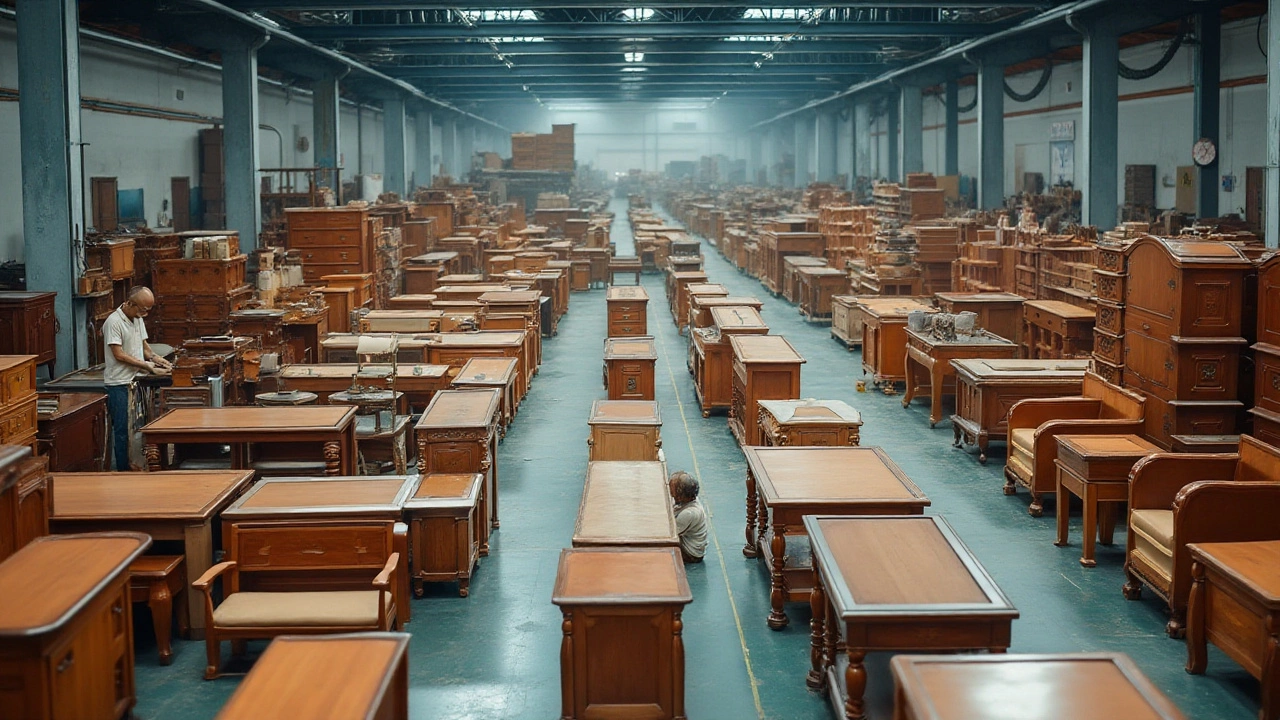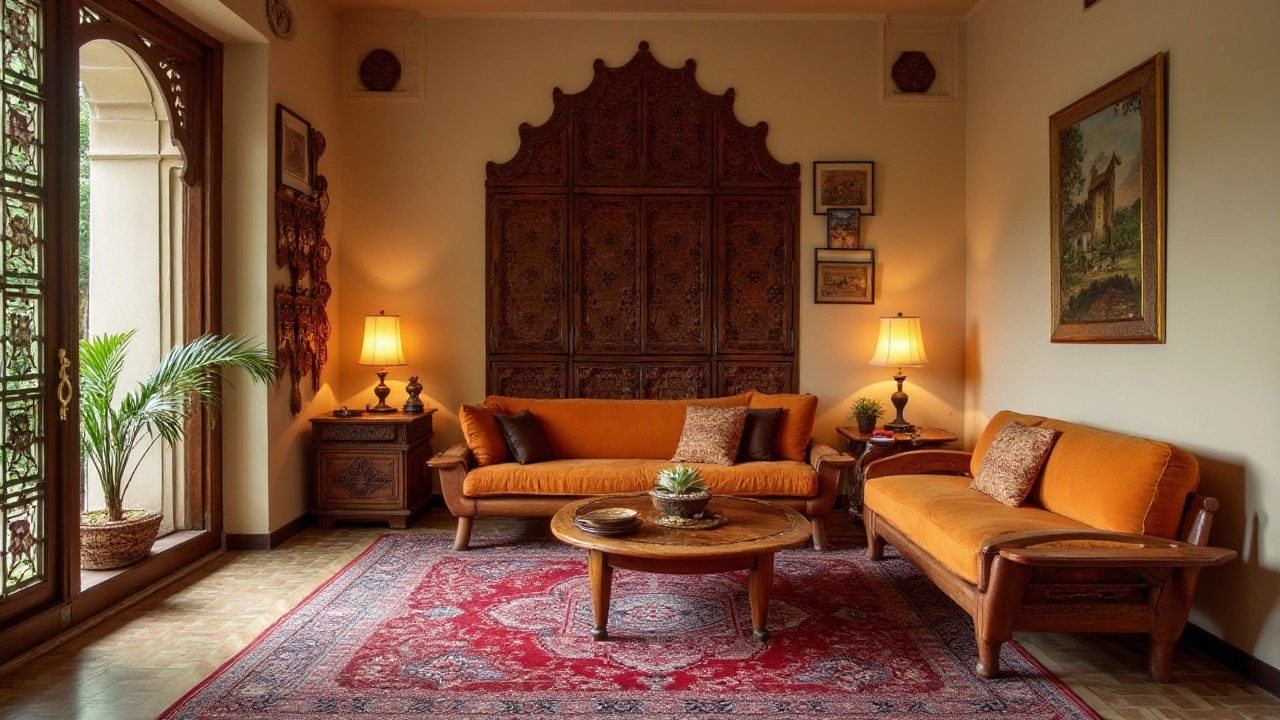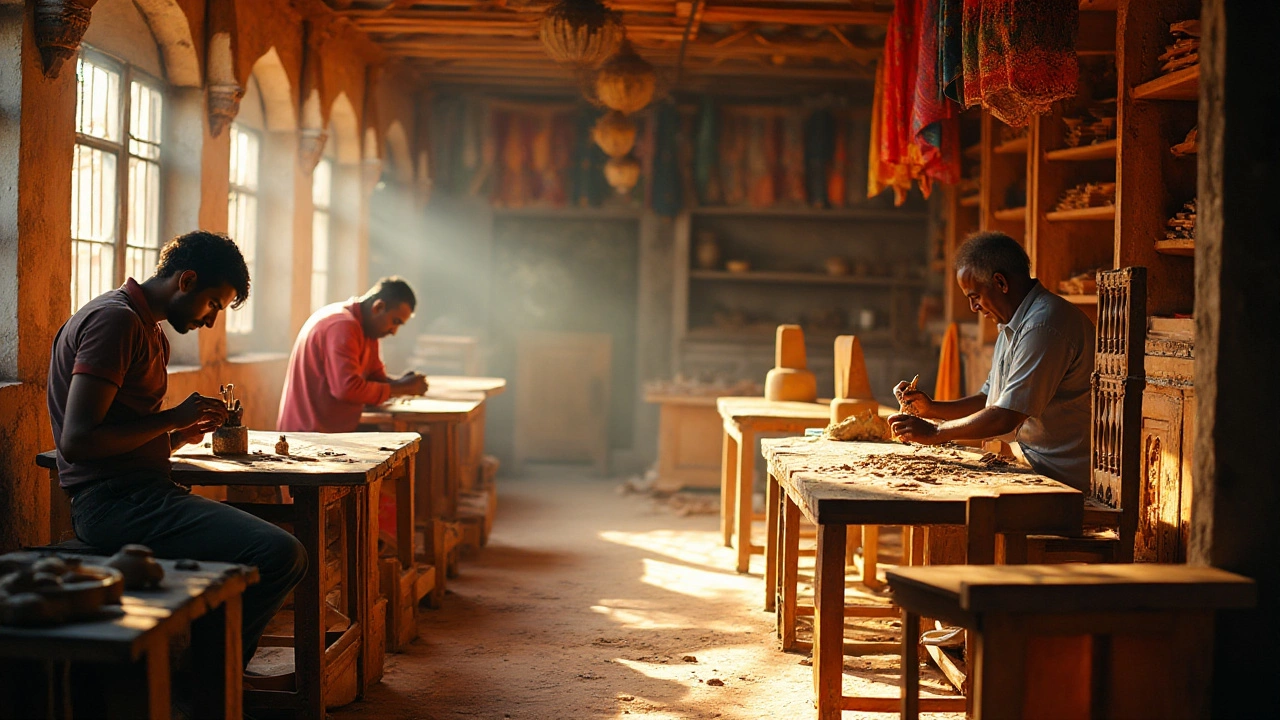India is not just a land of vibrant cultures and traditions, but it's also a powerhouse in the furniture manufacturing world. The nation blends old-world charm and modern innovation in its furniture craftsmanship, presenting a captivating fusion for international markets.
Home to several industry giants, the Indian furniture sector caters to both domestic demand and exports, with creations that range from exquisite handmade pieces to sleek, contemporary designs. As we dive into the various facets of this industry, we'll explore the leading companies, the latest trends capturing consumer interest, and how these manufacturers are adapting to the pressing need for sustainability.
- Introduction to India's Furniture Manufacturing
- Top Players in the Indian Furniture Market
- Emerging Trends in Indian Furniture Designs
- The Role of Sustainability in Manufacturing
- Future Prospects for Indian Furniture Industry
Introduction to India's Furniture Manufacturing
The world of furniture manufacturing in India is as diverse and vibrant as the country itself. Spanning generations, Indian woodworking and furniture making have consistently attracted attention and admiration from across the globe. At the core of the industry are ancestral techniques that date back centuries, where regional artisans continue to pass down their rich legacy of craftsmanship. These artisan skills are intricately interwoven with modern technology, creating an industry that respects its roots while embracing innovation.
India's furniture industry can primarily be split into two segments: the unorganized sector and the organized sector. The unorganized sector, comprising small workshops and family-owned businesses, is steeped in shop-floor craftsmanship. These small-scale operations often focus on intricate handmade furniture that captures cultural motifs unique to the specific regions they hail from. In contrast, the organized segment includes established companies that boast impressive production lines, catering to massive domestic and international markets with both quantity and contemporary quality.
In recent years, India has risen to become one of the top furniture exporters, showcasing the world its ability to blend traditional aesthetics with practical and modern design philosophies. A notable fact is that the nation ranks high in Asia for its furniture production volume, sharing space with the likes of China and Vietnam. This surge has been driven not only by artistic craftsmanship but also by the strategic locations of manufacturing hubs in places like Jodhpur and Saharanpur, which provide logistical ease for exports.
Modern Indian furniture manufacturers are increasingly focusing on sustainable practices, partaking in the global movement towards eco-friendly production. This paradigm shift in the industry addresses the increasing consumer consciousness regarding environmental impact. Many companies have started adapting using responsibly sourced materials and ethically managed labor forces, a change that has been met with both appreciation and demand from international buyers. A sustainable approach has the potential to set these manufacturers apart.
As the market grows, the Indian government plays an encouraging role by supporting initiatives that bolster furniture manufacturing capabilities, emphasizing the sector's potential as a significant contributor to the national economy. Policies promoting the Make in India campaign have opened new opportunities for domestic and foreign investors, leading to enhanced infrastructure and increased capacity building. According to industry analyst Rakesh Mishra, "India stands poised to leverage its skilled workforce and cultural heritage to become an enduring force in the world furniture market."
The dynamic nature of India’s industry ensures that its furniture trends evolve continually, influenced by global movements but always retaining a unique Indian flavor. Whether it is the comfort of a plush recliner or the elegance of minimalist designs, Indian manufacturers deliver a blend of style and functionality. As we look further into the intricacies of this industry, it is evident that Indian furniture has more than what meets the eye—a testament to the resilience and adaptability of its artisans and corporations alike.
Top Players in the Indian Furniture Market
India's furniture market is a vibrant ecosystem thriving on the interplay of tradition and contemporary growth. One of the most significant names in this sector is Godrej Interio. As a division of the Godrej Group, they have been at the forefront of furniture innovation and quality in India. Known for their ergonomic designs and sustainable practices, Godrej has carved a niche for itself not just within the country but also on the international stage. Their use of eco-friendly materials and a commitment to reducing carbon footprints have become a benchmark for other manufacturers. Manufacturers from India are increasingly turning towards sustainable solutions, making this a shared mission.
Another giant making waves is Nilkamal, a leader in molded furniture and material handling products. They have been instrumental in introducing affordable, stylish furniture to the masses, with an extensive retail presence. The brand emphasizes functionality without compromising on design, appealing to a wide consumer base. Their unique selling proposition lies in merging affordability with style, a combination that has seen their popularity soar. One can't mention furniture in India without acknowledging Pepperfry. As one of the pioneers in online furniture retailing, they have revolutionized access to a plethora of designs at the click of a button.
"Emerging markets have shown a significant inclination towards e-commerce platforms, with Pepperfry among the noteworthy leaders," said a report from Global Retail Insights.Pepperfry's success story is also mirrored by Urban Ladder, another prominent player in the digital domain. With their sleek, modern designs and attention to consumer demands, these companies represent the dynamic shift towards digital transformation in the Indian furniture industry.
It's important to note that the sector is not just dominated by expansive corporations. Artisan brands and small-scale enterprises contribute significantly to the tapestry of India's furniture market. In recent years, there has been a notable rise in demand for affordable, high-quality designs that showcase India's incredible skill in craftsmanship. As such, seasoned fit-out specialists like Featherlite and Durian are thriving by offering bespoke services to institutional and commercial clientele. This demand has spurred a variety of innovative solutions, ensuring that the entire spectrum of customer needs, from individual buyers to big business, is addressed with finesse.

Emerging Trends in Indian Furniture Designs
In recent years, the landscape of furniture design in India has been undergoing a fascinating transformation. The fusion of tradition and modernity has given rise to designs that are as functional as they are aesthetically pleasing. One of the most notable trends is the incorporation of sustainable materials. With growing environmental concerns, many Indian manufacturers are shifting towards eco-friendly materials like bamboo, reclaimed wood, and recycled metals. This not only reduces the environmental impact of their production processes but also caters to a new wave of environmentally conscious consumers.
Another trend gaining momentum is the
The Role of Sustainability in Manufacturing
In recent years, the conversation around sustainability has taken center stage in industries worldwide, including the furniture industry in India. This shift wasn't born out of a whim but a necessity driven by environmental challenges that have continued to escalate. Manufacturers are increasingly acknowledging their responsibilities, not just to their customers and shareholders, but also to the planet. The drive for sustainable practices has pushed companies to explore and adopt new methods that minimize environmental impact while still maintaining product quality and aesthetic.
Sustainability in the Indian furniture industry is closely tied to the careful selection and use of raw materials. Many companies are turning to renewable resources, such as bamboo and responsibly sourced timber. Additionally, the incorporation of recycled materials is becoming commonplace. A significant aspect of sustainability is reducing waste; hence, manufacturers are optimizing production processes to ensure less material is discarded. This not only helps the environment but can also cut costs, a valuable dual benefit.
Technology also plays a vital role in enhancing sustainable manufacturing practices. Utilizing energy-efficient machinery and adopting innovative technologies such as CAD (Computer-Aided Design) for precision crafting are some ways manufacturers are minimizing their carbon footprint. According to a study by the International Journal of Sustainable Engineering, implementing these technologies can reduce production emissions by up to 30%. This is a promising development for an industry historically reliant on resource-intensive methods.
Traditional Indian furniture manufacturers often blend artisanal techniques with modern sustainability strategies. “Our craft has always been about harmony with nature,” remarks a representative from a renowned artisanal workshop. This approach not only preserves the rich heritage of Indian furniture design but also sets a standard for what contemporary sustainability can achieve. These companies demonstrate that history and innovation can walk hand in hand toward an eco-friendly future.
Moreover, consumer awareness around environmental issues is increasing, prompting a demand for sustainable products. Indian manufacturers are responding to this shift by offering transparency in their sourcing and production practices. By doing so, they are not only meeting consumer expectations but also building stronger, trust-based relationships with their customers. The greater push towards sustainability is transformative for the industry and offers a competitive edge on the global stage.
Many Indian companies are participating in initiatives and certifications that validate their sustainability claims. Certifications such as the Forest Stewardship Council (FSC) label or the Indian Green Building Council (IGBC) mark assure consumers of the eco-friendliness of a product. These measures are crucial not just for reputational advantages but also for compliance with international trade requirements. As environmental regulations tighten worldwide, aligning with these standards will help maintain and expand market access.
The role of sustainability in the furniture industry isn't just about implementing current practices; it's about a long-term commitment to innovation and improvement. The more Indian manufacturers invest in sustainable technologies and processes today, the more they set themselves up for success in an eco-conscious future. This forward-thinking approach may very well propel India to not only be a leader in furniture production but also a pioneer in sustainable manufacturing practices globally.

Future Prospects for Indian Furniture Industry
The Indian furniture industry stands on the brink of a dynamic future filled with promise and transformation. As the global market increasingly turns towards sustainable and ethically produced goods, India's furniture manufacturers find themselves in a pivotal position to leverage their traditional craftsmanship and marry it with innovative technology. Already we see small to large-scale manufacturers integrating eco-friendly materials like bamboo and recycled wood into their products, thus proving their commitment to sustainable practices. Such initiatives not only reduce environmental footprints but also attract a growing demographic of environmentally conscious consumers. The potential for growth is vast, propelled by rising disposable incomes in urban areas and an increased interest in stylish, quality home décor.
The role of technology cannot be overemphasized in this transition. With the advent of smart furniture and IoT, the demand for tech-integrated home and office fixtures is rising. Indian manufacturers are gradually exploring these avenues, with certain companies experimenting with concepts like smart workspaces and energy-efficient lighting solutions built into furniture. A statistic that echoes this trend is the projected growth of the smart furniture segment, expected to grow at a compound annual growth rate (CAGR) of around 21% globally over the next decade. Such advancements not only offer a competitive edge but also open new markets for export, further enhancing India's reputation as a leading {furniture} producer.
Another promising prospect lies in the burgeoning e-commerce sector. As online shopping platforms expand, furniture manufacturers are tapping into these virtual marketplaces to showcase their wares. This not only grants them access to a wider audience but also helps reduce costs associated with physical showrooms and inventory storage. Industry experts predict that online furniture sales will witness approximately a 10% increase in the Indian market annually, as increasingly tech-savvy consumers prefer to explore, customize, and order products from the comfort of their homes.
The Confederation of Indian Industry (CII) notes, "The digital transformation in furniture retailing is reshaping customer experiences and driving growth across the sector."
Government policies and trade relations will also play a crucial role in the industry’s development. The Indian government's focus on initiatives like 'Make in India' encourages enhanced domestic production and aspires to attract foreign investment into manufacturing capabilities. This governmental push serves as a catalyst for increased collaboration between local artisans and international brands, fostering a blend of unique design aesthetics combined with quality assurance. Additionally, favorable trade relations and policy adjustments for easier exports could allow Indian furniture to permeate new global markets.
In conclusion, while challenges remain in terms of infrastructure and competition, the future of India’s {furniture} industry appears bright, with ample opportunities for both established giants and emerging artisans. By harnessing their rich heritage of craftsmanship, committing to sustainable practices, and integrating technology, Indian manufacturers are poised to become central players on the world stage, offering products that resonate with cultural richness and contemporary innovation.






